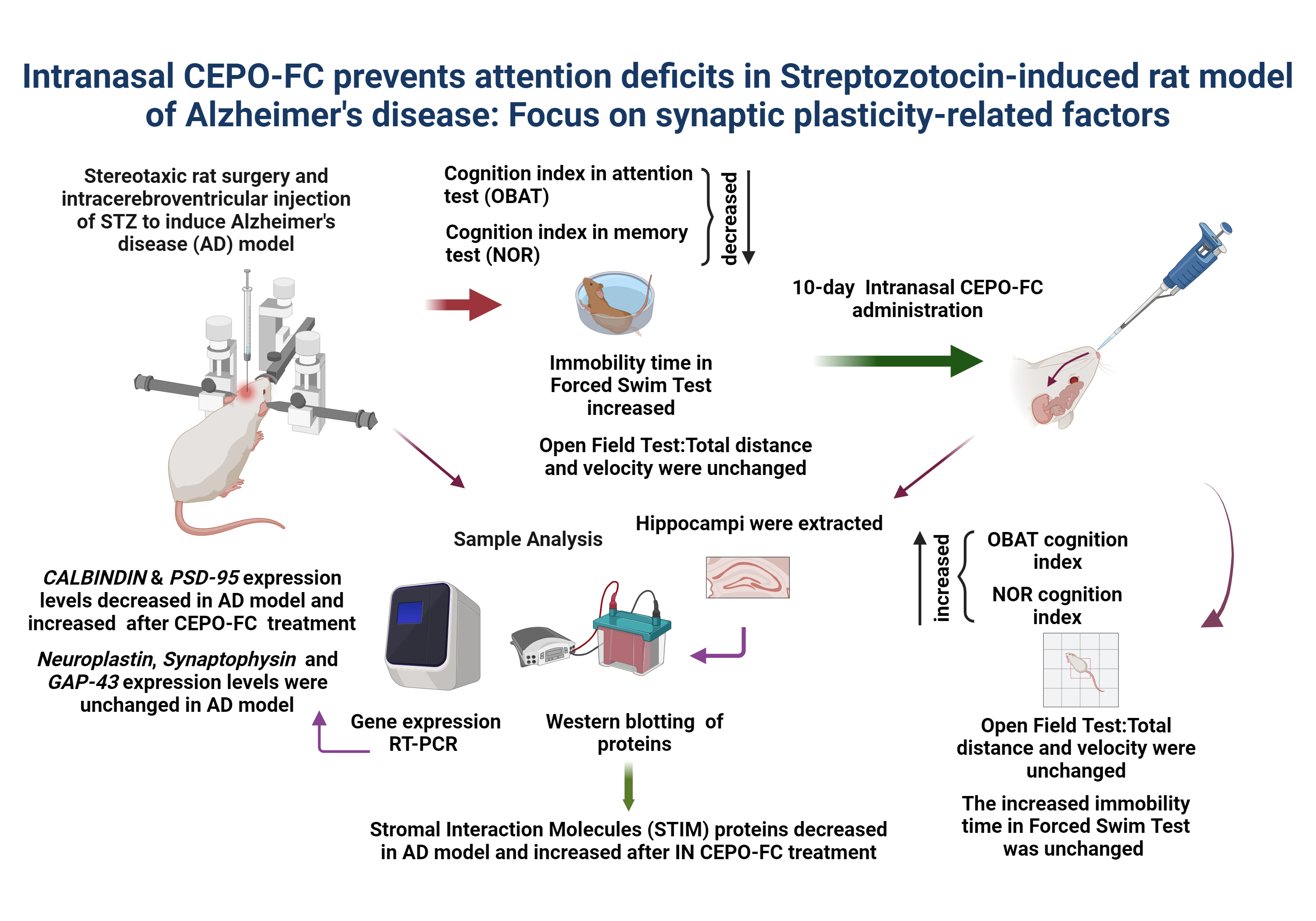Intranasal CEPO-FC prevents attention deficits in streptozotocin-induced rat model of Alzheimer's disease
Focus on synaptic plasticity-related factors
DOI:
https://doi.org/10.17179/excli2023-6818Keywords:
Alzheimer’s disease, attention, intranasal, CEPO-FC, STIM proteins, synaptic plasticityAbstract
Alzheimer's disease remains an issue of great controversy due to its pathology. It is characterized by cognitive impairments and neuropsychiatric symptoms. The FDA approved medications for this disease, can only mitigate the symptoms. One reason for the lack of effective medications is the inaccessibility of the brain which is encompassed by the blood-brain barrier, making intranasal (IN) route of administration potentially advantageous. Male Wistar rats underwent stereotaxic surgery to induce an Alzheimer's disease model via intracerebroventricular (ICV) streptozotocin injection, and Carbamylated Erythropoietin-Fc (CEPO-FC), a derivative of Erythropoietin without its harmful characteristics, was administered intranasally for ten consecutive days. Cognition performance for memory and attention was assessed using the Novel Object Recognition Test and the Object-Based Attention Test respectively. Depression like behavior was evaluated using the Forced Swim Test. Western blotting was done on the extracted hippocampus to quantify STIM proteins. Calbindin, PSD-95, Neuroplastin, Synaptophysin and GAP-43 genes were assessed by Realtime PCR. Behavioral tests demonstrated that IN CEPO-FC could halt cognition deficits and molecular investigations showed that, STIM proteins were decreased in Alzheimer's model, and increased after IN CEPO-FC treatment. Calbindin and PSD-95 were downregulated in our disease model and upregulated when treated with IN CEPO-FC. While Neuroplastin, and GAP-43 expressions remained unchanged. This study suggests that IN CEPO-FC in low doses could be promising for improving cognition and synaptic plasticity deficits in Alzheimer's disease and since IN route of administration is a convenient way, choosing IN CEPO-FC for clinical trial might worth consideration.

Downloads
Published
How to Cite
License
Copyright (c) 2024 Zahra Mansouri, Fariba Khodagholi, Jalal Zaringhalam, Fatemeh Abbaszadeh, Rasoul Ghasemi, Nader Maghsoudi

This work is licensed under a Creative Commons Attribution 4.0 International License.
Authors who publish in this journal agree to the following terms:
- The authors keep the copyright and grant the journal the right of first publication under the terms of the Creative Commons Attribution license, CC BY 4.0. This licencse permits unrestricted use, distribution and reproduction in any medium, provided that the original work is properly cited.
- The use of general descriptive names, trade names, trademarks, and so forth in this publication, even if not specifically identified, does not imply that these names are not protected by the relevant laws and regulations.
- Because the advice and information in this journal are believed to be true and accurate at the time of publication, neither the authors, the editors, nor the publisher accept any legal responsibility for any errors or omissions presented in the publication. The publisher makes no guarantee, express or implied, with respect to the material contained herein.
- The authors can enter into additional contracts for the non-exclusive distribution of the journal's published version by citing the initial publication in this journal (e.g. publishing in an institutional repository or in a book).





